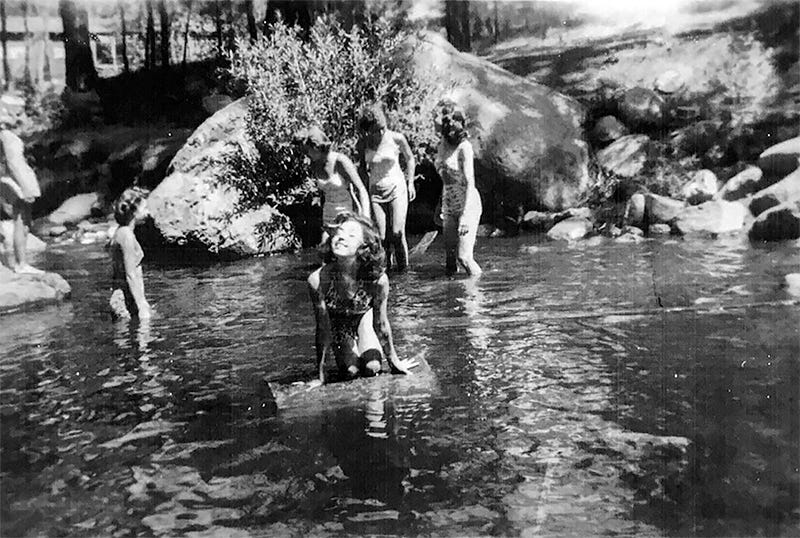Also on today’s menu:
Atomic Submarines Create Rift With France
France Wants It Too

“Barbara Kent joined Carmadean’s dance camp in the desert near Ruidoso, New Mexico, in the summer of 1945. During the day, she and nine other girls learned tap and ballet. At night, they slept in a cabin by a river. Early in the morning on July 16, 1945, Kent says that she — then 13 — and the other campers were jolted out of their bunk beds by what felt like an enormous explosion nearby.”
The explosion was the Manhattan Project’s Trinity test, the world’s first atomic bomb detonation. “The site had been selected in part for its supposed isolation. In reality, thousands of people were within a 40-mile radius, some as close as 12 miles away. Yet all those living near the bomb site weren’t warned that the test would take place. Nor were they evacuated beforehand or afterward, even as radioactive fallout continued to drop for days,” reports National Geographic.
Kent says that, since the blast, she began to hear of her fellow campers falling ill. By the time she turned 30, she says, “I was the only survivor of all the girls at that camp.”
The Radiation Exposure Compensation Act (RECA), passed by Congress in 1990, has dispensed more than two billion dollars to more than 45,000 nuclear workers and “downwinders”— those who lived near nuclear test sites conducted since World War II and may have been exposed to deadly radioactive fallout — but those exposed during the Trinity test and its aftermath have never been eligible. RECA is due to expire on July 11, 2022, and Senator Ben Ray Lujan, a Democrat from New Mexico, along with a bipartisan group of co-sponsors, hopes to expand the act to make those in the estimated Trinity fallout zone eligible, as well as other downwinder communities in Colorado, Idaho, and Montana.
Atomic Submarines Create Rift With France
France recalled its ambassadors in the United States and Australia, and canceled plans to celebrate its ties with the U.S., after learning of a pact, brokered by the United Kingdom, that will provide Australia with the technology to build nuclear-powered submarines.
The agreement, part of an effort to counter China’s influence in the South China Sea, was announced on Sept. 15 by President Joe Biden, U.K. Prime Minister Boris Johnson, and Australia’s Scott Morrison.
The French foreign minister said the “exceptional decision” to recall its ambassadors was justified by the situation’s “exceptional gravity.” The move cost France a multibillion-dollar sale it had reached to provide 12 conventional submarines to Australia.
With AppleTV’s adaptation of Isaac Asimov’s Foundation series set to begin on Sept. 24, I’ve been rereading his Trilogy and it strikes me that the deal with Australia is similar to the Foundation’s efforts to maintain its dominance over its neighbors in the galaxy by offering limited access to atomic technology.
Executive producer David S. Goyer said of his Foundation series, “because we’re adapting it now, over 70 years after Asimov first wrote it — you know, it was a metaphorical story back in the post-World War II environment — some of the events, some of the things that we’re interrogating, we’re going to have to change because we’re speaking to an audience of today and not an audience post-World War II.”
France Wants It Too
Despite the rift over atomic submarines, France's Électricité de France is in preliminary talks with General Electric about purchasing some of its nuclear power assets for around $1.2 billion.
GE Steam Power had purchased the power and grid business from France-based Alstom in 2015 and now provides steam turbines for Europe’s second-largest economy, and it is the main supplier of EdF's nuclear power plant at Britain's Hinkley Point, a $30 billion project that is expected to come online in 2026.
GE's broader Power division generated around $300 million in operating profits over the second quarter, and its 7 percent operating margin was the best in four years. A sale of the steam turbines business, analysts have argued, would leave Power to focus more on higher-margin services linked to its existing portfolio.
Please Support Our Efforts
The News Café is a virtual meeting place where we discuss the news of the day. An effort by the Liberty Independent Media Project, the work does not rely on advertising, as most media outlets do, freeing us to provide an independent focus on events and cultural issues. The project instead relies on direct monetary support from donors and subscribers.
If you like what we’re doing, please give what you can. Subscriptions to this newsletter are available for as little as $5 per month. Subscribers can share their knowledge, thoughts, and questions about any topic, and we may select some of those subjects for more in-depth analysis.
If you’re unable to pay but still want to receive all of the free public posts in your in-box, click the Subscribe button and select a free subscription.
Subscribe to The News Café
Exchanging and Engaging in News Topics






